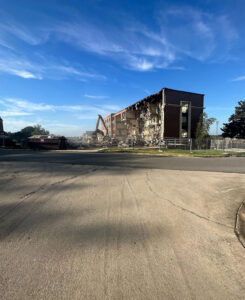
“Danger: Construction site no trespassing,” reads a warning sign plastered on the fence perpendicular to the main entrance to the nearly leveled Gibbs Hall.
Starting Monday, FAMU officially began the demolition process of Gibbs Hall, according to a statement from Bodie Young, Florida A&M University’s facilities project manager.
The statement also informs students and faculty of parking lot closures for the time being.
“The parking lot behind Sampson Hall and Gibbs Hall Trail will be fenced off during the demolition.”
Prior to the demolition certain buildings on campus experienced water outages for a few hours due to the rerouting of underground utilities. Students were notified via email.
A 500-bed residence hall is scheduled for the new lot to be funded by the $11 million the FAMU board of trustees approved in April.
A 700-bed residence hall, as well as an 800-bed apartment style complex, will also draw from the allotted funds, completing a three-project student housing plan by the university. These housing additions will be the latest newly constructed dormitories on FAMU’s campus since the $125 million FAMU Towers project in 2019.
In October 2022 FAMU gained an additional 118-beds near campus in a $12.65 million acquisition of Light House at Brooklyn Yard apartment complex, located at 636 Eugenia St.
Gibbs Hall will certainly be missed. A popular FAMU related Instagram page “905theFlava” posted the news this week and encouraged any past Gibbs Hall residents to share their experience with the dorm.
“My old dorm,” one comment read. “RIP Gibbs,” said another.
The post has garnered thousands of likes and comments.
Gibbs Hall, built in 1955 and named after FAMU co-founder Thomas V. Gibbs, was one of FAMU’s oldest residence halls. The late co-founder also served in the Duval County House of Representatives in 1885 and 1887.
Young, who’s at the helm of the project, told WCTV he was a resident of Gibbs Hall his freshman year. While nostalgia bears some weight, Young says the renovation is necessary.
“Though we may be losing a piece of our history, we’re actually not losing it because we’re going to foster in new housing for our students for years to come,” Young said in an interview with WCTV.
While there is no completion date for the 500-bed residence hall the demolition process is expected to be completed soon, Young said.
Labor and demolition has cost the university $1.5 million, according to Young.